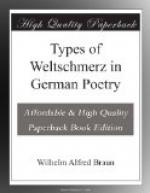Schlich mich, wenn ich satt
gegessen,
Weg von meinem lustigen Geschwisterpaar.
O! in meines kleinen Stuebchens
Stille
War mir dann so ueber alles
wohl,
Wie im Tempel war mir’s
in der Naechte Huelle,
Wann so einsam von dem Turm
die Glocke scholl.
Als ich weggerissen von den
Meinen
Aus dem lieben elterlichen
Haus
Unter Fremden irrte, we ich
nimmer weinen
Durfte, in das bunte Weltgewirr
hinaus,
O wie pflegtest du den armen
Jungen,
Teure, so mit Mutterzaertlichkeit,
Wann er sich im Weltgewirre
mued gerungen,
In der lieben, wehmutsvollen
Einsamkeit.[21]
This love of solitude is carried to the extreme in his contemplation of a hermit’s life. In a letter to Nast he says: “Heute ging ich so vor mich hin, da fiel mir ein, ich wolle nach vollendeten Universitaets Jahren Einsiedler werden—und der Gedanke gefiel mir so wohl, eine ganze Stunde, glaub’ ich, war ich in meiner Fantasie Einsiedler."[22] And although he never became a hermit, this is the final disposition which he makes of himself in his “Hyperion.”
These habits of thought and feeling, formed in boyhood, could lead to only one result. He became less and less qualified to comprehend and to grapple with the practical problems and difficulties of life, and entered young manhood and the struggle for existence at a tremendous disadvantage.
Another trait of his character which served to intensify his subsequent disappointments, was the strong ambition which early filled his soul. He aspired to high achievements in his chosen field of art. In a letter to Louise Nast, written probably about the beginning of 1790, he makes the confession: “Der unueberwindliche Truebsinn in mir ist wohl nicht ganz, doch meist—unbefriedigter Ehrgeiz."[23] The mere lad of seventeen had scarcely learned to admire Klopstock, when he speaks of his own “kaempfendes Streben nach Klopstocksgroesse,” and exclaims: “Hinan den herrlichen Ehrenpfad! Hinan! im gluehenden kuehnen Traum, sie zu erreichen!"[24] It is remarkable to note how this fancy of a dream-life becomes fixed in Hoelderlin’s mind and reappears in almost every poem. Closely allied to this idea is that of a “glueckliche Trunkenheit,” and expressions like “wie ein Goettertraum das Alter schwand,” “liebetrunken,” “Wie ein Traum entfliehen Ewigkeiten,” “siegestrunken,” “suesse, kuehne Trunkenheit,” “trunken daemmert die Seele mir,” can be found on almost every page of his shorter poems. Hyperion expresses himself on one occasion in the words: “O ein Gott ist der Mensch, wenn er traeumt, ein Bettler, wenn er nachdenkt, und wenn die Begeisterung hin ist, steht er da, wie ein missrathener Sohn, den der Vater aus dem Hause stiess, und betrachtet die aermlichen Pfennige, die ihm das Mitleid auf den Weg gab,"[25] which further illustrates the extravagant idealism by which he allowed himself to be carried away, and the etherial and thoroughly




